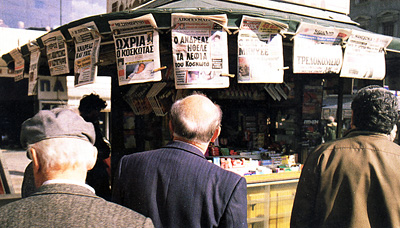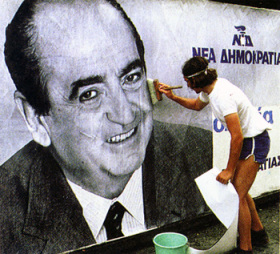Awash in Scandal, Greece Wrestles its Political Furies
By Stephen Brookes in Athens • Insight Magazine • March 6, 1989
For months, one of the most popular plays in the fashionable downtown theater district of Athens has been a raucous, gleefully ribald political satire called "The Last Pasok Emperors." It’s a freewheeling portrayal of a society run amok: Debauched elderly demagogues frolic with young women as minions conspire behind their backs, while all around them the country collapses into political and economic chaos. The script is kept deliberately loose - it has to be, to keep up with the real-life revelations that scream from Athens's tabloid dailies every morning: revelations of official corruption, of huge kickbacks and secret deals, of wheels within wheels of political intrigue and rot.
Greece's Andreas Papandreou, with Liana (l)
But there’s a bitter edge to the entertainment. With the socialist government of Andreas Papandreou rocked by scandal and corruption, and the aging prime minister himself an object of derision for his blatant affair with a buxom young blonde, many in Greece are wondering if the country is drifting steadily into chaos. Investigations have begun into some 50 major governmental scandals, several of which are thought to lead directly to the prime minister's office. At least two vicious and deadly terrorist groups are stalking the country's judiciary, as a paralyzed police force stands helpless and demoralized on the sidelines. Strikes by workers demanding 100 percent pay raises jam the city's thoroughfares, while the economy, crippled under a massive debt load and double-digit inflation, limps along on a Byzantine system of bribery and political patronage.
With national elections coming up in June, the political climate is heating up fast. Opposition parties on both the right and the left are on the attack, while the ruling Pasok party is suffering infighting and defections of high-level officials. Debates in Parliament degenerate quickly into shouting matches, faction accuses faction, and many fear that former President Constantine Karamanlis was right when he said recently that Greece had become "a vast insane asylum."
Observers on both the left and the right say it is increasingly unlikely that Papandreou, 70, can extricate himself and Pasok, the Panhellenic Socialist Movement, from the collapse of his seven-year regime. Rarely venturing out in public, the prime minister has been keeping a low profile and spends most of his time closeted with trusted advisers, including his 34-year-old mistress, Dimitra Liani. Still weak from the heart surgery he underwent last fall and battered by an unrelenting tide of scandals, he is said to be leaving important decisions to his deputies, some of whom are fending off investigations into their own conduct.
"Papandreou is not, in fact, governing Greece," says Constantine Mitsotakis, the head of the opposition New Democracy party and the man who presents Papandreou with his biggest electoral change. "The country is without a government."
Within Pasok, the party Papandreou founded in 1974 and led to victory in 1981 and again in 1985, long-hidden fault lines are beginning to show. Several key figures have quit in disgust over the government's handling of banking and arms dealing scandals, and at a December meeting of the party's 140-member executive committee one in four members openly opposed Papandreou's leadership. As he heads for a messy divorce from his wife, Margaret, a respected leader of the Greek women's movement, his ratings in public opinion polls have plunged. Many suspect him of being personally involved in the unprecedented corruption that has spread through the government; at a meeting of the party's parliamentary group Jan. 14, former deputy health minister Silvia Akrita angrily accused the government of running "a nursery for parasites."
It's a widely shared opinion. "There are some people in Pasok who are gentlemen, but most have degenerated into political gangsters," says George Sekeris, head of the Foundation for Political Studies and Education in Athens. "Power has become the sole objective. It's not just a party, not just another government. Pasok gives the impression of being an organized operation aimed at the public treasury."
The government is sustaining body blows on an almost daily basis from a series of scandals that started to break open last fall. The most damaging centers on a young banker and wheeler-dealer named George Koskotas, a financial wunderkind whose meteoric climb to the top of Greek society ended suddenly in late October when he was indicted on charges of embezzling more than $200 million from the Bank of Crete. Koskotas, who fled the country in a private jet and is now in jail in the United States awaiting extradition to Greece, has threatened to implicate high government officials. As a parliamentary investigation deepens, evidence is surfacing that close associates of Papandreou, and perhaps the prime minister himself, may be deeply involved.
The Koskotas affair has captured the public imagination like nothing in recent Greek memory. It has touched people personally - almost everyone in Athens either had money in Koskotas's bank or knew someone who did - and the sheer scope of the crime is, by Greek standards, breathtaking.
“A quarter to a third of a billion dollars in a country whose legal economy is only about $42 billion," says an Athens-based diplomat. "This thing is Drexel [Burnham] Lambert, Ivan Boesky and Billy Sol Estes rolled into one ." And with all the right ingredients - a fat banker, mink-coated women, death threats, corrupt politicians, suitcases of cash passed surreptitiously in Athens hotel rooms - the papers have been having a field day.

George KoskotasThe first smell of impropriety appeared several years ago. The New York-raised Koskotas, 35, had returned to Greece in 1979, shortly before being indicted in the United States on charges of defrauding the Internal Revenue Service and the New York state unemployment office of $41,000. Safe in Greece, Koskotas found a job at the Bank of Crete as a mid-level manager and managed within a short time to buy up a 2 percent share of the bank. But suspicions were raised in 1984 when he suddenly and surprisingly bought majority control of the bank, reportedly for $6 million to $8 million.
Alarm bells quickly went off in the press. Athens's half-dozen major dailies began spreading reports that Koskotas was part of a Mafia-backed money laundering operation and demanded an investigation. But the government stalled, even when the Bank of Greece (the national central bank) was alerted by foreign banks several months later that Koskotas appeared to be involved in questionable foreign exchange transactions.
For the next several years, say parliamentary investigators, attempts by Demetrios Chalikias, the Bank of Greece governor, to investigate Koskotas's dealings were blocked by delaying tactics and obstructionism on the part of high-level government officials, including Justice Minister Agamemnon Koutsogiorgas. During that time, Koskotas began assembling a media empire called Grammi Inc. that at its height included seven magazines and daily newspapers, as well as a radio station, real estate and Greece's most popular soccer team -- all paid for, investigators now say, by funds embezzled directly out of the Bank of Crete.
But by late last year, Koskotas's castle of sand was beginning to crumble. Worried by the growing rumors, Bank of Crete depositors began to close accounts en masse, and the banker found himself in a cash crunch. Again, say investigators, he appealed to his protectors in the government.
Says John D. Paleocrassas, a member of the parliamentary committee investigating the case, "We know that in the summer of 1988, during which Koskotas met with the prime minister at least once, large sums of money were deposited with the Bank of Crete by a dozen governmental organizations and enterprises." Olympic Airways, the Greek Telecommunications Corp., the Post Office Bank, the Bank of Attica and a number of other government controlled companies shifted some 5 billion drachmas ($35 million) from other accounts into the Bank of Crete, doubling its deposits.
As evidence of governmental involvement with Koskotas began to mount, so did pressure for full disclosure. In late September, he was finally forced to turn over to investigators photocopies of the documents he had used to acquire ownership of the Bank of Crete, which stated that he had $13 million in deposits with Merrill Lynch & Co. Inc. and $17 million at Irving Trust Co. in New York.
For the banker, it was the beginning of the end. Both banks quickly confirmed that the documents were forged, and a special commissioner was appointed to run the Bank of Crete. Within days, he said he had found evidence that Koskotas had embezzled some $235 million and asked for his indictment on multiple counts of forgery, embezzlement and fraud.
In a move critics say points to a judicial conspiracy, the courts gave the banker an unprecedented 11 days to prepare his response to the indictment, rather than the 48 hours specified in Greek law. The opposition, smelling a rat, was furious. Mitsotakis warned in a full session of Parliament that Koskotas would be allowed to escape.

The news: more scandalOn the evening of Nov. 6, Koskotas eluded a special surveillance team numbering dozens of police and left from Athens airport on a private jet owned by Argyris Saliarelis, an important Greek businessman said to have personal ties to Papandreou's wife. After flying first to Malta to pick up his family, then to Brazil before arriving in the United States, he was arrested in Massachusetts Nov. 23 on the U.S. charges pending against him and is being held while awaiting extradition hearings.
Koskotas's escape forced Anastassios Sehiotis, the minister of public order, and Minister of Justice Koutsogiorgas to resign. The allegations continued to grow as the Bank of Greece's Chalikias accused Koutsogiorgas of muzzling his investigation. Trying to defuse the spreading crisis, Papandreou reshuffled the government Nov. 16, but the damage was already done. Appalled at the prime minister's clumsy handling of the situation, three popular and influential Pasok figures resigned from the government.
While Koskotas awaits extradition, the parliamentary investigating committee has uncovered several key pieces of evidence that appear to implicate Papandreou himself, including a letter dated Oct. 27 from Koskotas to the prime minister asking him to hinder the investigation. And formal charges that involve receiving money from Koskotas were brought Jan. 31 against George Louvaris, one of the prime minister's closest friends and confidants. Investigators suspect that the money was then passed on to Papandreou. Says one member of the investigating committee, "He acted as the intermediary between Koskotas and the prime minister."
Papandreou denies any complicity, denouncing the entire affair as a foreign instigated conspiracy aimed at bringing down his government. Dimitris Maroudas, a close aide to the prime minister, told reporters in January that Papandreou and President Francois Mitterrand of France were the victims of an international rightwing plot "to overthrow all socialist and progressive forces in Europe," and the pro-government paper Avfiani claimed that the Koskotas scandal had been based, from beginning to end, on a CIA psychological warfare manual.
As the investigation draws in its net, few doubt that the affair will dominate the upcoming elections. But a potentially even more serious matter involving graft and illegal arms sales by two government-controlled companies has been emerging since November, when Deputy Defense Minister Stathis Yotas charged that the Hellenic Arms Industry (EVO) and the Munitions and Cartridges Co. (Pyrkal) had been involved in selling weapons to Iraq and that five top EVO officials (including its director, Stamatis Kambanis) had been involved in financial improprieties.
Charging that Papandreou's top economic adviser, George Katiforis, had pressured him to allow the exports, Yotas resigned in December, saying, "I refuse as a member of the government to be identified by the people as being part of a group of cheats and embezzlers of public wealth."
Shortly after Yotas's dramatic departure, a Dutch court imposed a $1.4 million fine on the Dutch company Muiden Chemie for smuggling gunpowder and hand grenade parts to Iran through the two Greek companies, which had provided end-use certificates. Such documents guarantee that the arms are for the use of the army and will not be reexported. But according to insiders, the Greek guarantee has been thin to the point of transparency.
"Until a year ago everybody could issue an end-use certificate -- I mean everybody," says a prominent international arms dealer based in Athens. "If you went to an assistant to the minister of defense and he wanted to make some money, he'd just take a piece of paper, sign it and stamp it. And he'd have made, say, $100,000."
With an official investigation now under way, Hellenic Arms Industry officials contacted by Insight refused to comment on the charges. But the Athens arms dealer says the company played "a significant role" in illegal arms trading through Greece. "They are a government-controlled company and have been issuing their own EUCs all along. They also have a factory down in Aigion, with its own ports and customs officials, whom they can manipulate; they have been there for years and have become part of the game. So, they can bring their own vessels into port to load or unload whatever they want. They're beyond control."
The corruption extends into the private sector as well. Greece's only private arms maker, Hellenic Explosives and Ammunition Co., or Elviemek, was sold in 1984 to a party who "is definitely a front man for the South Africans," says the arms dealer, who knew the previous owner well. Pretoria reportedly began buying shares of the company in 1977, when the United Nations imposed an arms embargo against South Africa, and has been using Elviemek to buy technology and explosives, both for its own use and to trade with h-an for oil.
With these and dozens of smaller scandals breaking around his head, Papandreou's political survival past June depends more than ever on how well he can manipulate the election. Many think he will start a counterattack against New Democracy soon, accusing the party of corruption of its own. Some suspect he may cook up a crisis in the Aegean Sea to focus Greek anxieties on traditional enemy Turkey or revive the kind of anti-American rhetoric that has served him well in the past. Others suggest he might even stage a phony military coup attempt as an excuse for suspending the election.
But the prime minister's main advantage over his opponents lies in the fact that he is entitled under the constitution to choose the next electoral system, even to the extent of dividing the country into any number of electoral districts, each with its own rules. Pasok ran the last election on a system of "reinforced" proportional representation, which discriminates against smaller parties and gives an advantage to the front-runners. Four years ago, that made sense for Pasok - it holds 52 percent of the seats in Parliament even though it took only 46 percent of the vote. But with New Democracy yards ahead of Pasok in the polls, using the same system now would give Mitsotakis a powerful majority.

Marching against Pasok in Athens That is something that Papandreou and other leaders on the left intend to avoid at all costs. The small parties of the non-Pasok left have formed a pre-electoral coalition and are lobbying for a purer form of representation that would give each party seats in the Parliament precisely in proportion to the number of votes it receives. Popular support for such a system is strong: Close to 10,000 people from almost every political party mounted a protest march through the streets of Athens Jan. 26, demanding more democratic representation.
If Papandreou accedes to that demand, it would hurt his own party but increase the overall strength of the left, positioning him as the leader of a coalition government. With Pasok in disgrace, that may be the best he can hope for, but there is some question as to whether Greece's other leftwing parties would play along. They have been distancing themselves from Pasok as the scandals have spread, and the largest the Communist Party of Greece, or KKE - says flatly that it will not support Papandreou.
"There's a real clash between Pasok and the Communists," agrees Theodore Christodoulidis, a professor at the Panteios School of Political Science in Athens. "The KKE sees this election as the opportunity to promote the image of a party which can come to office through parliamentary methods, not the image of a revolutionary party. And I think they could reach up to 17 percent of the vote."
Some in the party see Pasok disintegrating even before the elections. “As soon as the unification of the left is completed, most of the people in Pasok will come to this new movement," says Dimitris Dessylas, a Communist Party spokesman and member of the European Parliament. "They're not going to New Democracy."
Despite its protests, it seems unlikely that the Communist Party would not take advantage of the chance to play a powerful and unprecedented role in the government. Analysts suggest that the party would probably support Pasok in exchange for some key objectives: kicking U.S. military bases out of Greece, for example, or halting extradition of terrorists. Even if Pasok can retain power in such a coalition, Papandreou's leadership is anything but assured.
"I think there would be pressure to give support to a coalition government on certain conditions. Certainly one would be that Papandreou not be prime minister," says Gerassimos Arsenis, who served as minister of the economy under Papandreou before leaving, in 1985, to form the Greek Socialist Party.
But dumping Papandreou may be easier said than done. The structure of Greek political parties makes it extremely difficult to mount a successful revolt against the leader, and many observers think that Pasok, deprived of its charismatic founder, would simply fall apart. Formed as a loose coalition of leftist parties, united only in their opposition to the fight, Pasok never developed a firm, unifying ideology.
"Papandreou just attached his slogans and projected policies to the various groups that were of interest to him. That explains why his policies were so contradictory," says Sekeris of the Foundation for Political Studies and Education. Rather than develop a coherent outlook, the emerging party counted instead on its leader's extraordinary personal magnetism.
"Papandreou is Pasok," says Christodoulidis. "Without him, it would be 10 or 12 small political factions without a leader." The New Democracy party, meanwhile, has grown in popularity. And since Pasok's record has so seriously undermined support for socialism in Greece, says Arsenis, if Papandreou were to step down "the anti-right feeling wouldn't be strong enough to hold the segments of the party together."
Moreover, it is unclear who would succeed him if, under the pressures of health, scandal or politicking in his own party, he did step down. And the costs of speaking up against the leader are high. "You don't really see any personality strong enough to succeed Papandreou," says Miltiadis Evert, the mayor of Athens and a member of New Democracy. "They've created an atmosphere where every deputy who wants to speak up honestly is branded a traitor."

Constantine Mitsotakis, head of the New Democracy PartyThe most popular party in Greece right now, and Pasok's main adversary in the June elections, is the broad-based, center-right New Democracy headed by Mitsotakis. Promising to reestablish democracy, clean government and economic pragmatism, Mitsotakis has been spearheading the multiparty attack against Pasok, and his party now leads Pasok by 10 to 20 percentage points in the polls. But for all its strengths, New Democracy has not carved out a role for itself as an entirely credible alternative. "The opposition continues to walk along the traditional path," says one analyst. "It is still the same old party that was, in effect, kicked out in 1981."
Others worry that Mitsotakis himself remains a liability. Brought in to head the party in 1981, he is felt to be the only politician in Greece tough enough to take on Papandreou and win. Nevertheless, he has an image problem. He’s considered to be one of the main architects in a splintering of the Center Union government of Georgios Papandreou that led the way to the 1967 military junta. Mitsotakis's apostasy left an impression of dishonor that lingers in many Greek minds. "Everybody recognizes that he's smart, but people just don't trust him," says a Western diplomat.
Some analysts say that a long period of political instability lies ahead no matter what government emerges in June. The new government will face a second election in March 1990, when it has to select a president to succeed Christos Sartzetakis. That may be difficult with a coalition government: 180 votes in Parliament are needed to elect a president, and Pasok, even with its majority, barely managed to muster that number in the last go-around, in 1985. If it proves impossible, the government will be forced to call new elections.
"We're really talking about an electoral period that will last for more than another year and may lead to the emergence of a new generation of leadership to replace both Papandreou and Mitsotakis," says one diplomat. "This could be the last hurrah for both of them."
References (12)
-
 Response: Government Schemes
Response: Government Schemes -
 Response: casual shoes in pakistan
Response: casual shoes in pakistan -
 Response: Parimatch
Response: Parimatch -
 Response: Social Media Marketing Agency
Response: Social Media Marketing Agency -
 Response: social media marketing agency
Response: social media marketing agency -
 Response: international moving company dubai
Response: international moving company dubai -
 Response: ecommerce website development
Response: ecommerce website development -
 Response: Muscle mass loss
Response: Muscle mass loss -
 Response: Text Blast
Response: Text Blast -
 Response: Professional seo services
Response: Professional seo services -
 Response: Scrap
Response: Scrap -
 Response: Legal Advisory in UAE
Response: Legal Advisory in UAE


Reader Comments